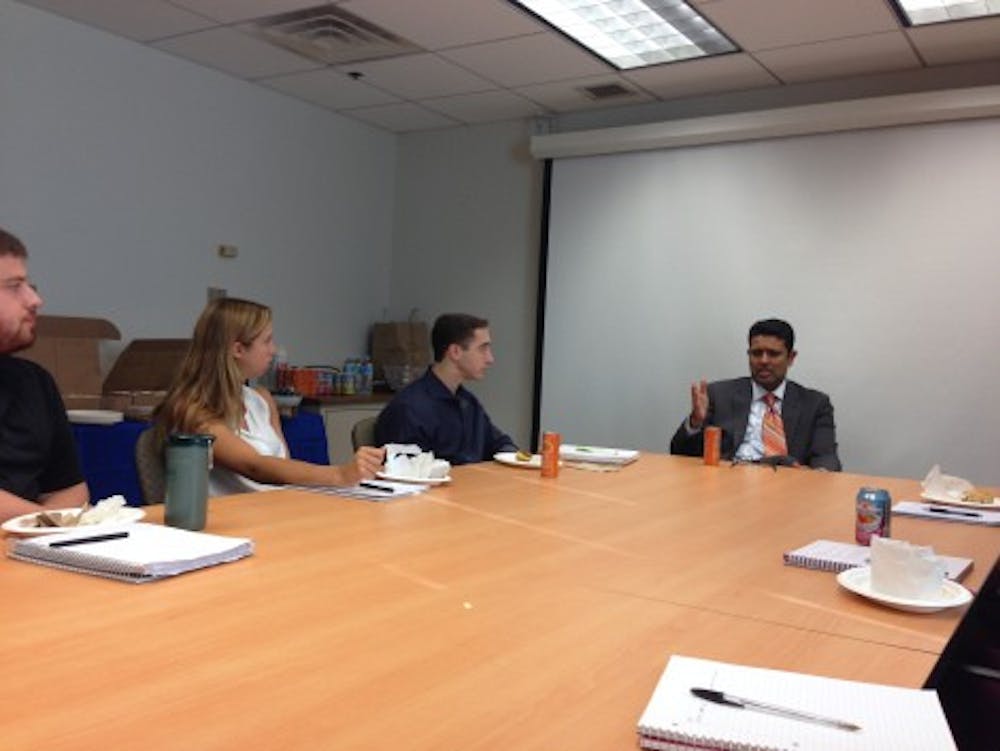By JACQUI NEBER
Hari Sreenivasan, the anchor of PBS NewsHour Weekend, visited Hopkins on the morning of Friday, Sept. 11 to speak to students about his career and experiences as a journalist. The talk was designed for International Studies majors and held in Mergenthaler 266.
Sreenivasan started at PBS in 2009, having previously worked as an anchor and correspondent for CBS and ABC News. He graduated from the University of Puget Sound, after which he worked for a variety of different companies but never as a print journalist.
To begin the conversation, Sreenivasan took a poll of how many students in the room used Snapchat as a regular method of communication. Almost every student raised a hand, which seemed to surprise the journalist, since he takes issue with the app’s lack of permanence. (Snapchats disappear a few seconds after being opened.)
“Institutions of record should have a record of what they publish,” he said. “That gets a little weird for me.”
After this initial poll students steered the conversation, discussion centered around Sreenivasan’s experiences in the newsroom, pitching stories and thinking about what makes a story interesting.
“When you have the opportunity to enterprise and come up with your own pitches, you have to think about what’s a good story,” Sreenivasan said. “If you’re passionate about it, it’s pretty easy to decide.”
Sreenivasan said a news anchor’s primary job is making his or her story palatable to viewers. He also explained some of the differences between PBS and other broadcasting companies. According to Sreenivasan, PBS’s audience is informed, educated and patient.
“We’re structurally in a different league,” he said. “Our end goal is not to figure out if [the viewer] will stay. It gives me access to do the kind of work that I’m more interested in.”
Sreenivasan advised students on potential career paths, encouraging them to do what they love. For Sreenivasan, career satisfaction is necessary to produce good work.
“If you aren’t nourished by that job, profession or craft, you have to start thinking about what you really want,” he said.
Sreenivasan discussed the state of cable news in today’s society. He described cable news stations as feeding consumers information they already believe in and therefore limiting the free exchange of ideas and constructive debate.
“I think what you get when you watch cable news today... you’re hearing what you already feel. It’s an echo chamber,” Sreenivasan said.
He also said that watching a news station like PBS may challenge viewers’ beliefs and build a more informed public.
“Your argument for your point of view may be made even stronger by hearing the best defense from the other side,” he said.
Students had generally positive reactions to Sreenivasan’s discussion.
“I absolutely loved the event! It was an amazing way to meet such a prominent figure in the international news community and hear his side of the story, no pun intended,” sophomore Sarah Fauska wrote in an email to The News-Letter. “He truly captivated the room when he spoke and I definitely took what he said to heart!”
Sophomore Sophie Mirviss also thought the discussion was valuable.
“Hari was so friendly and funny, he really made me feel like he was just talking to a bunch of friends. His stories were captivating and interesting. I think the thing he said that really resonated with me the most was when he said if you do something for 30 days and still aren’t spiritually nourished, you should look for something else to do,” Mirviss wrote in an email to The News-Letter.
Junior Sam Sands explained that, as an International Studies major, he found Sreenivasan relevant and informative.
“I try to be active in the department since they have been trying hard to promote more activities and a sense of department community,” Sands wrote in an email to The News-Letter. “As for the event, I really enjoyed it! It was very interesting to see the opinion of the news from the other side of the camera so to speak.”
As a close to the discussion, Sreenivasan advised Hopkins students to learn outside of the classroom. He also encouraged students to dig into diverse areas of study.
“There is so much more that will influence you and shape you than what happens in the classroom,” Sreenivasan said. “You’re at an amazing institution, and if you take advantage of that,





